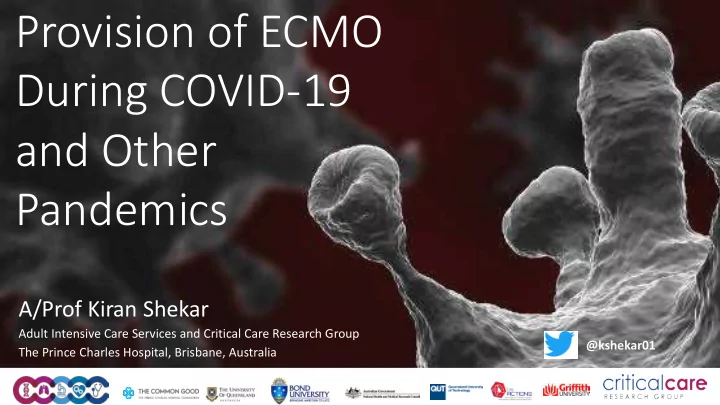

Provision of ECMO During COVID-19 and Other Pandemics A/Prof Kiran Shekar Adult Intensive Care Services and Critical Care Research Group @kshekar01 The Prince Charles Hospital, Brisbane, Australia
Discussion Points Can we provide ECMO? Should we provide ECMO? Who should receive ECMO? How to organise services?
Can we provide ECMO?
ECMO Provision The ability to provide ECMO during a pandemic is determined by ICU capacity.
nCoV 2019 A highly transmissible virus infecting large numbers of people.
Rapid Spread nCoV 2019 is spreading rapidly within and between populations. World Health Organisation 18 March 2020
Global Spread Enormous numbers of people are being infected Worldwide. World Health Organisation 18 March 2020
Up to 60 % of the population may be infected
15-20 % Who test positive will need hospitalisation
5-10 % Who test positive will need ICU admission
Critical Care Beds Critical care beds are a finite resource. No health system has enough beds to meet the expected demand.
Health Care Needs Likelihood of hospitalization, need for critical care, and mortality rate increases with age Imperial College COVID-19 Response Team 16 March 2020
Predicted Surge Critical care resources will be exceeded by demand based on containment models. Imperial College COVID-19 Response Team 16 March 2020
Surge Pressure on ICU China - 5% of patients who tested +ve admitted to ICU Italy - 12% of patients who tested +ve admitted to ICU (16% of all hospitalized) Survival time of non-survivors is 1-2 weeks. Graselli et al. JAMA 2020
Surge Pressure on ICU Aim to have a critical care bed for all who need and might benefit from ICU care. This may not always be possible.
Global ECMO Capacity- Finite
Flattening the Curve
Can we provide ECMO? If the curve is flatter then resource-intensive therapies such as ECMO can be considered if indicated.
Should we provide ECMO?
What is the Role for ECMO? ICU capacity may be exceeded by 5-15 fold. COVID-19 2019 is not H1N1. Do we really have the resources for ECMO? Is there a reason to increase ECMO capacity?
ECMO Use and H1N1 ECMO use increased with H1N1 ~20-30 run/year rise H 1 prior to 2009 N 1 Extra 603 runs 2009- 2010
VV ECMO and H1N1 1175 patients with ARDS (1966-2015) Median Age 40y 42% received ECMO Mortality 37.1% Median ECMO duration 10d Median MV duration 19d Median ICU LOS 33d Sukhai et al. Ann Card Anaesth 2017
H1N1 Mortality and Age Age distribution of projected global and regional respiratory mortality, Majority (62%–85%) of for both pandemic and seasonal influenza mortality estimates. the 2009 H1N1 deaths occurred among persons under 65y of age “signature age shift” Simonsen et al. PLoS Medicine 2013
COVID 19 Mortality The majority of COVID 19 deaths are occurring in older patients The use of ECMO in this population is not our usual practice
What should we provide? High quality conventional ICU care on an large scale. Compassionate, value-based care is equally important.
Outcomes with ECMO -To date have been poor in patients with COVID 19 -Need for MCS
Should we provide ECMO? We don’t need more ECMO runs, we need good ECMO runs.
Who should receive ECMO?
Patient Selection Determined by patient characteristics ECMO is only ever used for selected patients. Should we use the usual selection criteria for COVID 19 patients? What do we know about the patients and the pathophysiology?
Patient Characteristics n=191 31 % ARDS (93% mortality) 23% HF (64% mortality) 20% septic shock (100% mortality)
Patient Characteristics n=201 84 (41.8%) developed ARDS 44 (52.4%) died
Patient Characteristics
Patient Characteristics
Mechanism of organ injury Resemble those seen in SARS & MERS coronavirus infection
Risk Factors for Death Increasing age Comorbidities The pathophysiology of COVID19 is Hyper inflammatory state unclear Extrapulmonary organ failures Leucopenia
200,000 cases and counting Global Crisis needs Global Collaborations… …join the other 120+ sites across the world! ecmocard@elso.org www.ecmocard.org @ecmocard
Who should receive ECMO? Carefully selected patients (need to develop COVID ECMO Scores) Ethical dilemmas will arise Bigger issue is: who should receive mechanical ventilation?
Who should receive ECMO? A small number of highly selected patients. If in doubt, don’t do it.
How to organise ECMO services? Need for ECMO likely small
Planning and Providing
An ECMO Action Plan ECMO Resource Planning ECMO Weaning, and Allocation Decannulation and Rehab Personnel Assignment Staff Support Personnel Training and Ethical Considerations ECMO use Infection Control Quality Assurance and Measures Collaborative Research Transport on ECMO Post-mortem Care
Balancing Our Roles in Pandemics ECMO Specialist We are Intensive Care Specialist here to do more than Health Care Worker just ECMO. Good Global Citizen
Let us do well what we normally do in ICU. Protect your staff
Adult Intensive Care Services, The Prince Charles Hospital
Recommend
More recommend